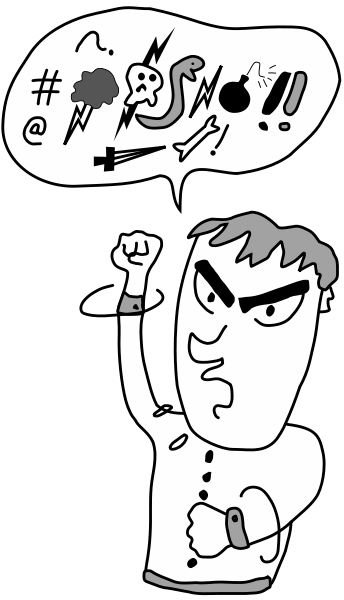Avoid the Legal Risks of Profanity in the Workplace
Do You Know It When You Hear It?
Swearing, vulgarity, cussing and cursing are just some of the manifestations that profane speech includes. Merriam-Webster’s learner’s dictionary defines profanities as offensive language, which includes expletives and obscenities. This same dictionary points out that sexual harassment is defined as “unwelcome verbal … behavior of a sexual nature.”
It is clear that when striving to identify inappropriate behavior in the workplace, profanity and discrimination as well as sexual harassment might be lumped together. Ensuring that the business runs smoothly is the prerogative of the management team, which should include a sensible approach to salty language and the liberal use of four-letter-words.
Reality of Swearing
In 2006, the Guardian published the results of a study including 308 senior managers in the United Kingdom. Of these, 36 percent viewed swearing as part and parcel of the workplace culture. Studies (Scientific American mentions a variety of researchers that link swear words with the baser portion of the brain structure) show that expletive use relieves pain and plays into the ‘fight or flight’ reflex of humans.
Proponents would argue that a few well-chosen cuss words in the right setting help to relieve stress. Opponents then counter with the understanding that vulgarity is a downer for workplace morale. It is the opposite of professionalism. Workers, especially women, feel intimidated by a supervisor’s using expletives. Managers view an employee who uses expletives as unfit for promotion because of his perceived inability to control his temper.
A Matter of Perception Under the Law
Perception is the keyword in this discussion. The worker using expletives is perceived to be unprofessional. A woman who is subjected to vulgar profanity may perceive it as sexual harassment. The member of a faith community perceives the improper use of the deity’s name as religious discrimination.
Hostile work environment suits generally cite 42 U.S.C. § 2000e-2(a)(1), which stipulates that a worker’s status as a member of a protective class leads to active discrimination. In Reeves v. C.H. Robinson Worldwide, Inc. (11th Cir., No. 07-10270, 2010), the court held that “we proceed with ‘[c]ommon sense, and an appropriate sensitivity to social context,’ to distinguish between general office vulgarity and the ‘conduct which a reasonable person in the plaintiff’s position would find severely hostile or abusive.’”
Tread lightly! In the unionized work environment, the use of some profanity may be exempt from regulation during “protected activities,” as outlined by the Teamsters Online.
Risk Abatement Via Workplace Policy
Are you willing to parse words over the use of colorful language in your business? This is a risk that can lead to many a lawsuit, which is not in the best interest of any company. Minimize the lawsuit potential by establishing a “no cussing” policy that gets integrated into the employee handbook.
A good profanity prohibition includes verbiage that:
- Identifies the scope of the rule.
- Explains the disciplinary action process (i.e. immediate dismissal at a first occurrence or write-ups and subsequent firing).
- Highlights acceptable remedial action.
- Identifies the starting date of the rule.
You can cover a fair bit of ground by beefing up your anti-discrimination and anti-sexual-harassment rules. Consider wording a no-profanity rule that picks up where these regulations leave off:
“XYZ Company prohibits the use of profane language on its properties. This includes the use of profane words, obscene expressions, racial as well as religious slurs or any type of verbiage that may be construed as offensive by hearers. A first offense results in a written reprimand. A second offense results in immediate termination of employment. This rule goes into effect on ___ date.”
If the human resources department opts to include this type of wording into the handbook, make sure that everyone knows about the rule. Failure to train current workers on a new workplace rule makes it difficult to defend against a wrongful termination suit. Remember also that the adoption of this rule, after the fact, may result in numerous disciplinary actions as workers become accustomed to the new way of doing business. Much like in parenting, curbing profanity in the workplace demands a concerted, immediate and consistent approach; do not allow selective enforcement of a no-swearing rule to take the bite out of the regulation.
Sources
- Merriam-Webster, https://www.learnersdictionary.com/search/profanity
- The Guardian, https://www.guardian.co.uk/money/2006/jun/03/careers.work
- Scientific American, https://www.scientificamerican.com/article.cfm?id=why-do-we-swear
- United States Court of Appeals, 11th Circuit, https://www.ca11.uscourts.gov/opinions/ops/200710270op2.pdf
- Teamsters Online, https://teamstersonline.com/forums/blogs/jimmy/105-profanity-workplace.html
- Image: “Swearing in Cartoon” by Tomia/Wikimedia Commons via public domain license
